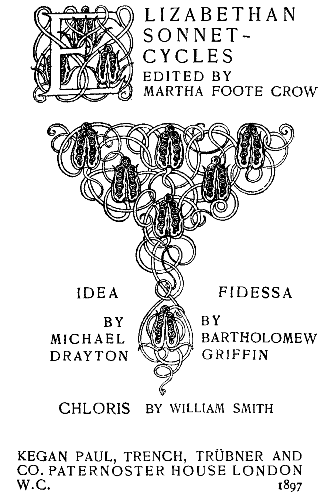E-text prepared by David Starner, Melissa Er-Raqabi,
and the Project Gutenberg Online Distributed Proofreading Team
()

ELIZABETHAN SONNET-CYCLES
EDITED BY
MARTHA FOOTE CROW
IDEA
BY
MICHAELDRAYTON
FIDESSA
BY
BARTHOLOMEWGRIFFIN
CHLORIS
BY
WILLIAM SMITH
KEGAN PAUL, TRENCH, TRÜBNER AND
CO. PATERNOSTER HOUSE LONDON
W.C. 1897
CONTENTS
IDEA
BY
MICHAEL DRAYTON
MICHAEL DRAYTON
The true story of the life of Michael Drayton might be told to,vindicate the poetic traditions of the olden time. A child-poetwandering in fay-haunted Arden, or listening to the harper thatfrequented the fireside of Polesworth Hall where the boy was a pettedpage, later the honoured almoner of the bounty of many patrons, one who"not unworthily," as Tofte said, "beareth the name of the chiefestarchangel, singing after this soule-ravishing manner," yet leaving but"five pounds lying by him at his death, which was satis viatici adcœlum"—is not this the panorama of a poetic career? But above all,to complete the picture of the ideal poet, he worshipped, andhopelessly, from youth to age the image of one, woman. He never married,and while many patronesses were honoured with his poetic addresses,there was one fair dame to whom he never offered dedicatory sonnet, asilence that is full of meaning. Yet the praises of Idea, his poeticname for the lady of his admiration and love, are written all over thepages of his voluminous lyrical and chorographical and historical poems,and her very name is quaintly revealed to us. Anne Goodere was theyounger daughter in the noble family where Drayton was bred andeducated; and one may picture the fair child standing "gravely merry" bythe little page to listen to "John Hews his lyre," at that ancestralfireside. "Where I love, I love for years," said Drayton in 1621. Aslate as 1627, but four years before his death, he writes an elegy of hislady's not coming to London, in which he complains that he has beenstarved for her short letters and has had to read last year's overagain. About the same time he is writing that immortal sonnet, thesixty-first, the one that Rossetti, with perhaps something too much ofpartiality, has declared to be almost, if not quite, the best in thelanguage. The tragedy of a whole life is concentrated in that sonnet,and the heart-pang in it is unmistakable. But Drayton had stood aswitness to the will of Anne's father, by which £1500 was set down forher marriage portion. She was an heiress, he a penniless poet, and whatwas to be done?
About 1590, when Drayton was twenty-eight, and Anne was probablytwenty-one years old, Drayton left Polesworth Hall and came to London.Perhaps the very parting was the means of reve